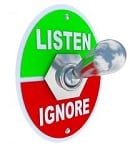What is it that makes emotional abuse so damaging?
It may not be what you think. Let me explain.
An emotionally abusive husband says things that are unkind, untrue – and unjustified – about you.
What do you do? You tell yourself that those things are to be taken seriously. Because he is to be taken seriously.
You set in motion a whole chain of thinking that makes perfect sense: “He’s my partner. So, he’s meant to love, cherish and respect me”. That thinking is absolutely true… and it isn’t.
He is meant love, cherish, and respect; no doubt about it. However, is he really a partner? Do you honestly believe that someone who behaves that badly is a true partner? He’s certainly someone who came into your life on a Partner Ticket. However his behavior suggests that he came by that Partner Ticket on false pretences.
When your emotionally abusive partner is having a hissy fit, he is not behaving like your partner. He’s not behaving like a partner, at all.
What do you do next? What do we all do next?
 As emotionally abused women, we create a story about our unworthiness, and their beastliness. We tell ourselves it only happens because we’re some kind of Not Good Enough (too fat, too old, too pathetic, too unattractive etc) while they’re horrible… And yet, we also tell ourselves, they’re lovely, really, when they’re not driven to behave horribly by our shortcomings.
As emotionally abused women, we create a story about our unworthiness, and their beastliness. We tell ourselves it only happens because we’re some kind of Not Good Enough (too fat, too old, too pathetic, too unattractive etc) while they’re horrible… And yet, we also tell ourselves, they’re lovely, really, when they’re not driven to behave horribly by our shortcomings.
If this sounds a little complicated and confused, there’s a reason for that: the thinking that arrives at this conclusion is complicated and confused.
Usually, when things get complicated and confused, they’re wrong. We’re missing something that could be obvious, and would be useful – could we but see it.
Let me share with you a personal story.
The reason why I married an emotionally abusive man is simple: emotional abuse was normal in my family of origin. I use the word ‘normal’ advisedly. It was the way family members communicated whenever their anger, fear, or inadequacy were triggered.
It didn’t take much to trigger that anger, fear, or inadequacy.
Everyone else in the family functioned that way. I’m not saying they functioned well. But they functioned. Damaging and destructive things were said… and then disregarded.
There was a long period of my life when many damaging and destructive things were said to me. I couldn’t take it. Maybe I had a few less skins than they did.
I told myself the story about my unworthiness, and their beastliness, and I estranged myself for long years.
Of course, nothing got resolved during those years. Time may be a healer, if you have 40-50 years to wait. But as a strategy it stinks. Especially when both parties continue to tell themselves the old story about the other, time stands still, while the hurt feelings carry on festering.
This week, I had the opportunity to have what is known as a ‘full and frank’ dialogue with a family member whose behavior, in my book, stank. He and his brother had caused me massive pain. Let me tell you what came out of that dialogue.
He did not remember what he had said and done. He only remembered my perceived faults, and the story he’d created about my hostility black ingratitude, and heinous rejection of the family. I truly believe he had forgotten his behaviour. For him, only my perceived wickedness remained.
Obviously, this is exactly the way that emotional abuse works. In this case, I don’t think the intention was to inflict maximum damage. Yet, I do think that the end justified the means; and damaging and destructive accusations looked justified in that other person’s eyes, as a tool for achieving their desired outcome.
Abusers never asked themselves about the morality of what they do: whether they have any right to behave that way, and force their preferred outcome down another person’s throat.
Cutting to the chase, because I was young and emotionally unskilled, I took it all personally. I thought that for the situation to change, they would have to change.
That was never going to happen.
If I had understood, then, that their modus operandi was to – how shall I put it? – fill their nappy, throw their toys out of the pram, and then go back to saying: “Look at me, I’m a really cute baby, you’ve got to love me,” my life would have been a lot easier.
I’m not saying I would have condoned their behavior. And I‘m not saying I would have stuck around. Spending any more time around emotional abuse than you absolutely must is never a good idea.
But I could have saved myself a lot of pain. I would have believed that their behavior was about them, NOT me, and let myself off the hook.
 When you truly realize that your emotionally abusive partner’s emotionally abusive behavior is never about you, you’re off the hook.
When you truly realize that your emotionally abusive partner’s emotionally abusive behavior is never about you, you’re off the hook.
You can see the hook, but it’s their hook. It has nothing further to do with you.
That’s what I want for you.
That’s when your life starts afresh.

Annie Kaszina, international Emotional Abuse Recovery specialist and award-winning author of 3 books designed to help women recognise and heal from toxic relationships so that they can build healthy, lasting relationships with the perfect partner for them, blogs about all aspects of abuse, understanding Narcissists and how to avoid them and building strong self-worth. To receive Annie’s blog direct to your Inbox just leave your details here.
The 5 Simple Steps to Healing from Narcissistic Abuse
Over the next 5 days, I'll send you some lessons and tips that I've found have really helped women to heal from narcissistic abuse. Starting with the basics.

